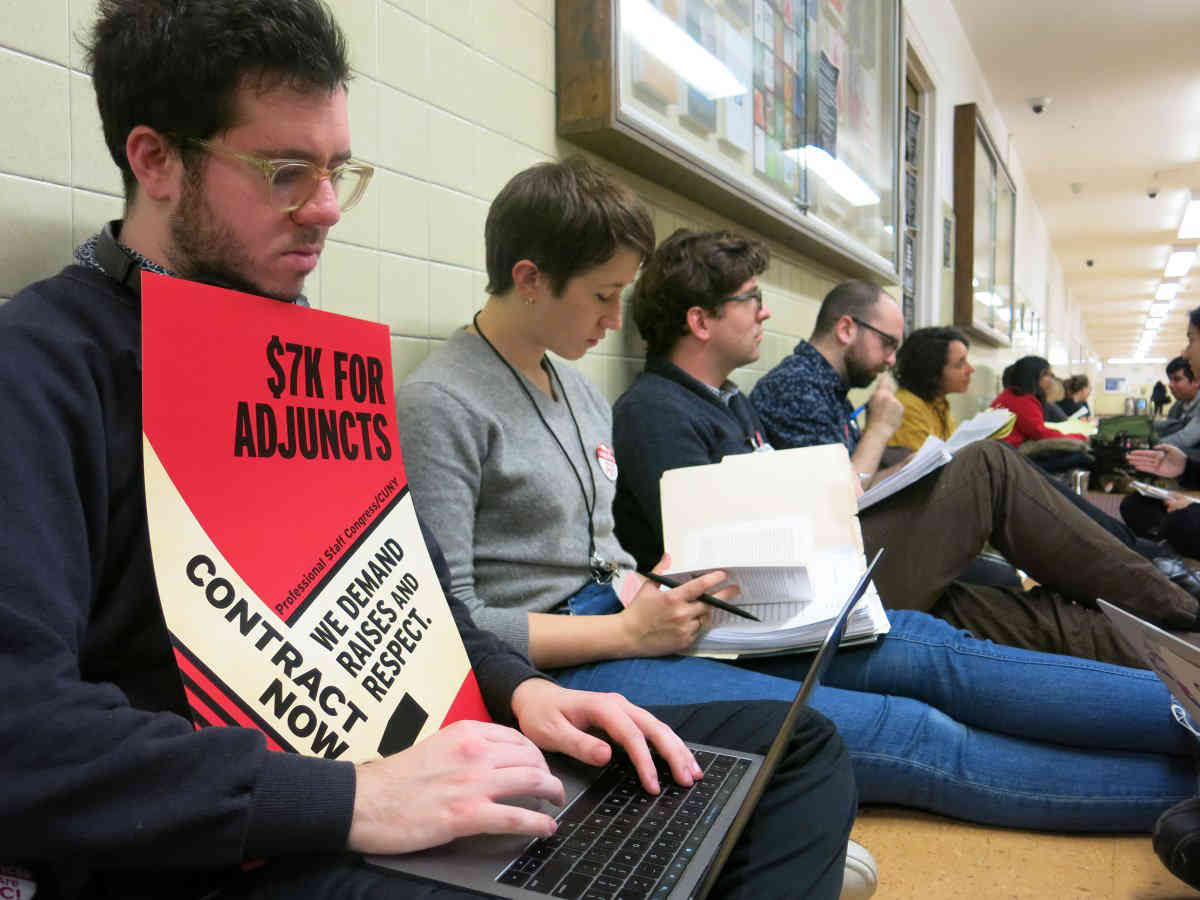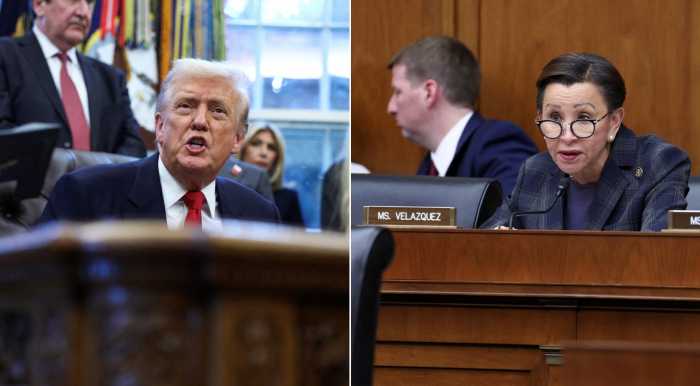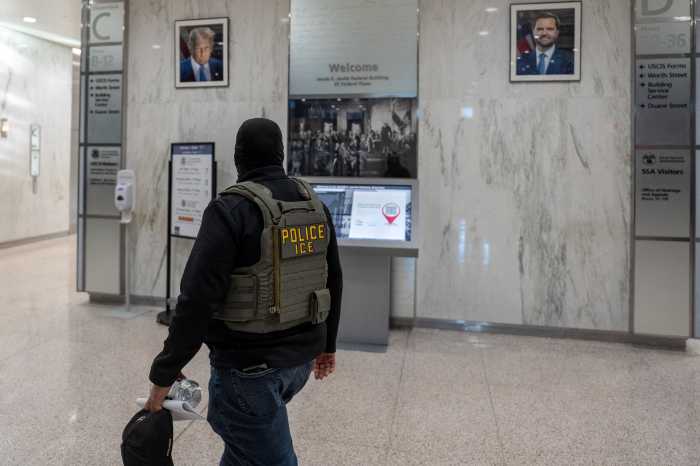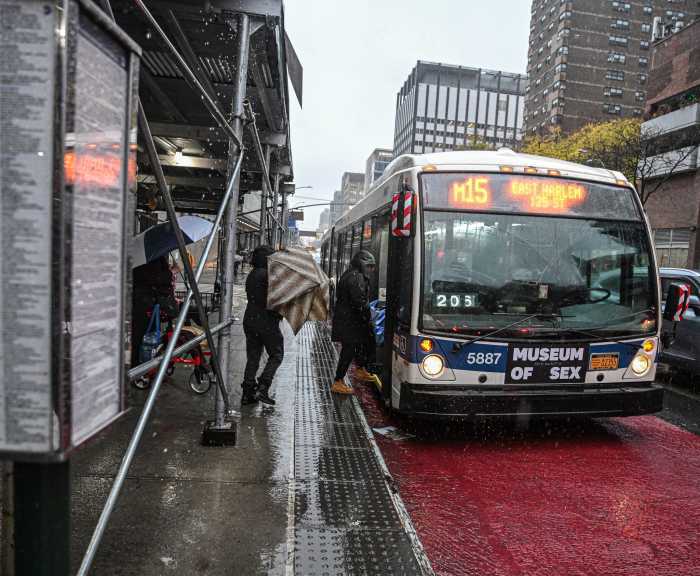Call it a lesson in negotiation.
Brooklyn College students will suffer if city and state officials do not raise the salaries of its part-time adjunct professors, dozens of faculty members warned during a recent protest.
“I don’t get compensated for what I do outside the classroom, and as a result my students suffer,” said two-year adjunct English teacher Alyssa Northrop, who said she also works as a private tutor in order to make ends meet.
Northrop — who joined some 40 fellow teachers, staff, students, and union leaders at a Dec. 11 protest on the Flatbush campus — said she used to do a lot more for her pupils, but began to cut back on the time she invested in them because the college refused to invest more in her as an educator.
“I can’t give them all the comments that I want to give them, and I have a limit of how much time I lesson plan,” she said. “I limit myself to an hour of lesson planning for every class, which sometimes isn’t enough.”
The group rallied outside the office of Brooklyn College President Michelle Anderson, demanding adjunct professors’ pay be doubled from the current median salary of roughly $3,500 per three-credit course, to a minimum of $7,000 per three-credit course.
Most of the protestors work as adjunct faculty at the college, and those teachers conducted a so-called “grade in” as part of the demonstration, during which they publicly corrected assignments as a way to show how much additional work they do without extra pay, according to a union leader who helped organize the rally.
“We’re asking adjunct faculty to do their work out in public to show the amount of labor they do without being fairly compensated for it,” said James Davis, the Brooklyn College chapter chair of the Professional Staff Congress, the City University of New York’s faculty-and-staff union.
Davis, who is also a full-time English professor at the college, is part of the union’s bargaining team that is in negotiations with CUNY management on a new contract for university staff, which would update the current employment and salary terms set back in 2010, he said.
But any new contract must first be signed off on by both Mayor DeBlasio and Gov. Cuomo, because the city’s public-university system is funded by both the local and state governments.
Another adjunct Brooklyn College professor of seven years said the union must authorize a strike if CUNY leaders do not institute the new $7,000-per-three-credit course salary.
“We hope that the board of trustees backs down and finds the money, we don’t want to go on strike, we want to do our jobs but we can’t keep doing them under these deteriorating conditions,” Tom Watters said at the protest.
Some 843 adjunct professors currently teach at Brooklyn College, compared to some 506 full-time educators, a difference in staffing that is consistent across the city’s public-university system, the professor and union leader said.
Adjunct lecturers can teach up to nine credits per semester, or three courses, on one CUNY campus, and an additional course at another location, amounting to a total annual median income of $28,000, according to Davis.
But full-time staffers at the lowest title and salary teach four courses per semester and make about $46,000 annually, compensation that can rise to an annual maximum of $82,700, and comes with a number of benefits packages, he said.
And raising Brooklyn College’s adjunct professors’ pay per three-credit course to $7,000 won’t only bring their salaries closer to those of their full-time colleagues, but would also bring CUNY’s compensation for part-time teachers closer to that of private city colleges, such as New York and Columbia universities, Davis said.
The union leader pointed fingers at former Mayor Bloomberg and Gov. Cuomo for the system’s failure to allocate more cash to adjunct lecturers’ salaries during negotiations for the 2010 contract, but said he is hopeful the state’s newly elected Democratic Legislature will push DeBlasio and Cuomo to provide more funds for the professors.
“Even though we still have the same governor, the composition of the state Senate has changed, and several of the new senators are true progressives who know about the higher-education system and the exploitative adjunct system,” Davis said.
A CUNY spokesman declined to answer this newspaper’s questions about the system’s ongoing negotiations with the union.
“Negotiations with the PSC are underway. We will negotiate at the bargaining table, not in the press,” said Frank Sobrino.
Brooklyn College spokesman Jason Carey declined to comment.


























